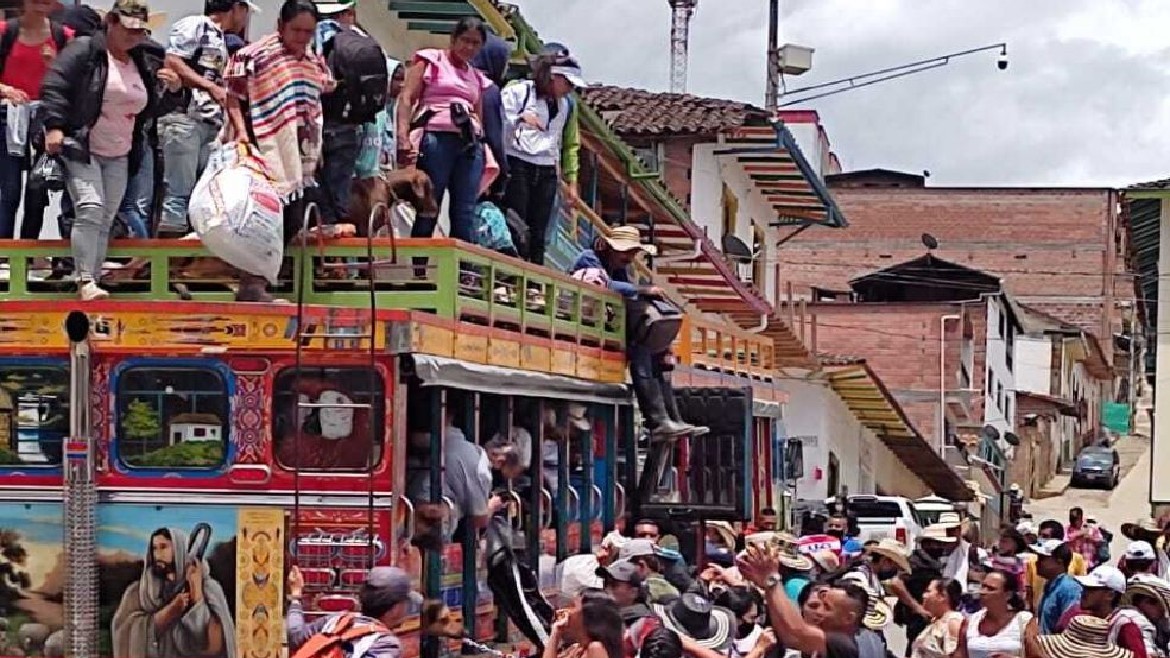Renewed violence and armed conflict in Colombia forced more than 57,000 people to flee their homes so far this year, according to the United Nations.
A report by UN’s humanitarian agency OCHA confirmed claims by Ombudsman Carlos Camargo, who rang the alarm about a sharp increase in forced displacement in July already.
Forced displacement since January 2020
Armed conflict and failing peace policies
Both the UN and the Ombudsman blamed the surge in forced displacement on illegal armed groups that forced entire communities to flee to other parts of the country.
Local NGO’s additionally blamed the government of President Ivan Duque of failing to implement a 2016 peace deal with demobilized FARC guerrillas, according to the OAS’ Inter-American Commission on Human Rights (IACHR).
Specifically, the IACHR stressed the governments failures to implement counternarcotics and rural development policies that would be part of the peace process.
Mass expulsions between January and July
The IACHR urged the Colombian government and security forces to comply with their obligations to prevent forced displacement, provide security and offer humanitarian support to conflict victims.
The IACHR urges the State of Colombia to redouble its efforts to formulate and implement public policies that effectively transform the structural causes of violence in the country, through comprehensive actions that guarantee the right to life, security and justice, as well as access to economic, social, cultural and environmental rights for this population. In this sense, it makes a special call to the State to strengthen the measures aimed at the integral fulfillment of the Peace Agreement, in the understanding that this constitutes an ideal tool to confront the structural causes of violence in the country.
IACHR
Duque denies reality
Duque carefully avoided any mention of forced displacement and rejected the IACHR’s claim that the government has failed to comply with the peace deal in his response.
The president on Saturday admitted that “of course there are challenges,” but added that the most recent UN report on the peace process “showed advances.”
We must continue to confront the criminals who want to assassinate social leaders and former combatants, but we continue to move forward with peace here and it would be good if the Commission could read the report of who does the review and monitoring in Colombia, which is the office of the Secretary General of the United Nations.
President Ivan Duque
The report by UN Secretary General Antonio Guterres confirmed the Duque’s failures to implement the elements of the peace deal that were highlighted by the IACHR.
In fact, the UN chief urged Duque to accelerate the implementation of the peace deal specifically in the regions where forced displacement has surged.
It is in areas such as these that the implementation of comprehensive rural reform and actions to strengthen the integrated presence of state institutions would make the greatest difference in curbing violence.
UN Secretary General Antonio Guterres
Who is behind the mass displacement?
According to think tank Codhes, unidentified armed were responsible for half of the forced displacement registered in Colombia in 2020.
In cases that Codhes was able to identify an aggressor, paramilitary groups were the main cause of mass displacement followed by groups formed by FARC dissidents and guerrillas of the ELN.
Illegal armed groups
Paramilitary groups have continued to be the primary cause of displacement in Colombia after the demobilization of their former umbrella organization AUC between 2003 and 2006 by Duque’s political patron, former President Alvaro Uribe.
In thousands of cases, these paramilitary groups displaced rural communities to help regional elites and corporations accumulate land through land dispossession rackets.
As a consequence, more than 16% of Colombia’s entire population had been forcibly displaced by the end of 2020, according to the UN’s refugee agency UNHCR.
People affected by forced displacement
Duque and the paramilitaries
The president was elected in 2018 with the help of the regional elites and convicted drug lord Marquitos Figueroa, a former member of the AUC.
The Supreme Court sentenced one of Duque’s political patrons to prison on Friday while investigating Uribe’s alleged role in the 2018 election fraud.
The investigations into the ties between the president’s political allies and paramilitary groups have devastated public support for Duque and his political party.


